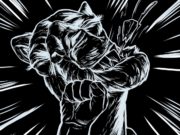Art imitates life. Form follows function. Those basic principles fuel and rule countless artistic and creative endeavours. Including the monumental Double Negative, Low‘s dozenth album in 25 years.
Now, I’m not suggesting the veteran slowcore outfit formed and fronted by husband and wife Alan Sparhawk and Mimi Parker intentionally or even subconsciously drew upon those guidelines during the writing and recording of this groundbreaking 11-song album. In fact, they almost surely didn’t. But there’s no denying the fact that Double Negative‘s lyrical content and sonic makeup boldly and artfully confront and reflect the tumultuous, fractious, disturbing and just plain cacophonous conditions comprising our current cultural and political realities. Which is to say: It’s one noisy, unstable mother.
Some of this should come as no surprise: Their last album, 2015’s exceptional Ones and Sixes, positioned the Duluth trio’s stock-in-trade — intensely deep slow-burn melodies topped by the ghost-meets-angel interplay of Sparkhawk and Parker’s voices — in a semi-industrial warehouse of distorted textures, white-noise static and dense bass tones. Reteaming with Ones and Sixes producer B.J. Burton at Justin Vernon‘s Eau Claire studio April Base, Low don’t just pick up where they left off here — they up the ante and go all in.
Reportedly, instead of writing and rehearsing an album of songs and then recording, they periodically went to the studio with snippets and ideas that Burton helped them build, shape, deconstruct and renovate into tracks. It shows. From the white-noise hiss and crunching rumble that kick off the album to the decaying synth pulse that ends it, this is a disc that shreds the traditional songwriting and production envelopes.
Some songs sound like Sparkhawk and Parker are singing through a tube into a malfunctioning fan; others sound like they were performed on a broken organ in an empty swimming pool; still others feel like field recordings from an empty graveyard, or broadcasts picked up on a car radio driving in and out of reception range on the road to oblivion. It’s unsettling, unpredictable, uncompromising fare. But it’s far from just some random glitchfest.
Despite all the post-industrial abrasion, ambience and instability, the sonics can’t overpower the beating heart and melodic soul of Low‘s songcraft. And despite no lack of effort, nor can they completely obscure paradoxically grim and alienated lyrics like “This time it’s over now … This evil spirit, man, it’s bringing me down … You don’t know what you’re even fighting for” and “Before it falls into total disarray / You’ll have to learn to live a different way.”
At one point, Sparhawk seems to sum up their state of mind when he says, “It’s not the end, it’s just the end of hope.” Maybe for them. But for the rest of us, there’s no reason to give up as long as artists like Low are making music this provocative and powerful. Sometimes a multitude of wrongs make a right.









































